by Taylor Wilken | Mar 22, 2019
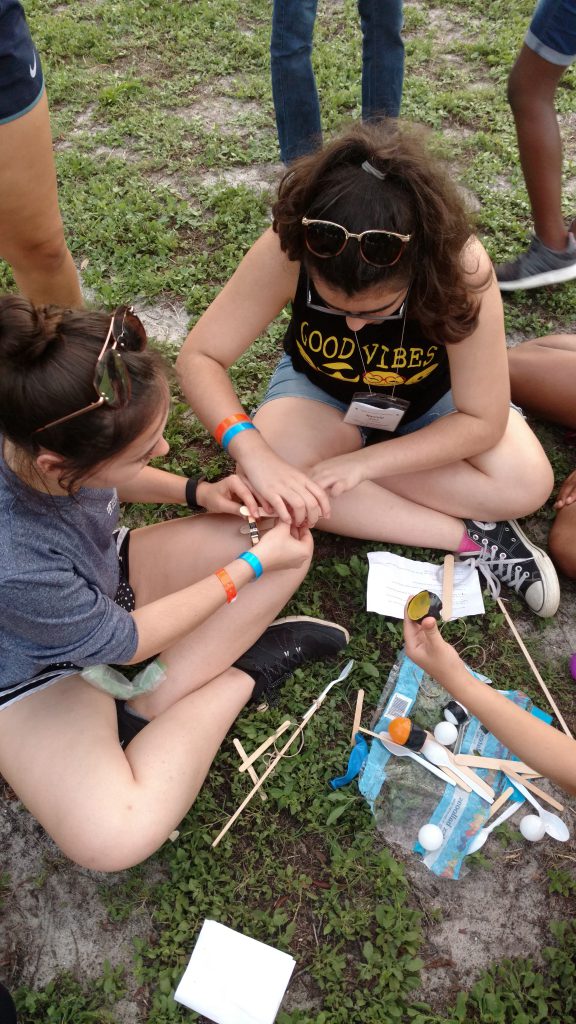 Summer camp…memories cherished and never forgotten. Camp fires, swimming, canoeing and kayaking, roughing it old-school in cabins and bunk beds, camp songs and skits around the fire, life-long memories and friendships…these are some of the experiences your child can have at 4-H Camp Timpoochee or 4-H Camp Cherry Lake this summer!
Summer camp…memories cherished and never forgotten. Camp fires, swimming, canoeing and kayaking, roughing it old-school in cabins and bunk beds, camp songs and skits around the fire, life-long memories and friendships…these are some of the experiences your child can have at 4-H Camp Timpoochee or 4-H Camp Cherry Lake this summer!
Time to Unplug
4-H summer camps are places for youth to unplug and get some fresh air while gaining valuable skills that last a lifetime. A core philosophy of 4-H camp is “letting kids be kids” by utilizing the learn-by-doing approach with a balance of routine and unstructured time within a nurturing environment where youth feel a sense of community and belonging.
Explore & Discover
Campers are encouraged to get out of their comfort zones to discover and explore their interests, talents, and values. Classes including creative dramatics, marine exploration, air rifle, mad science, and many other programs allows them to explore and excel. Campers gain confidence, empowerment, and resiliency through these new experiences. A sense of community and belonging grows from the traditional camp songs and dances they learn. New friendships are formed from the multi-county dynamic that the 4-H summer camp provides where youth meet kids from other counties and walks-of-life.
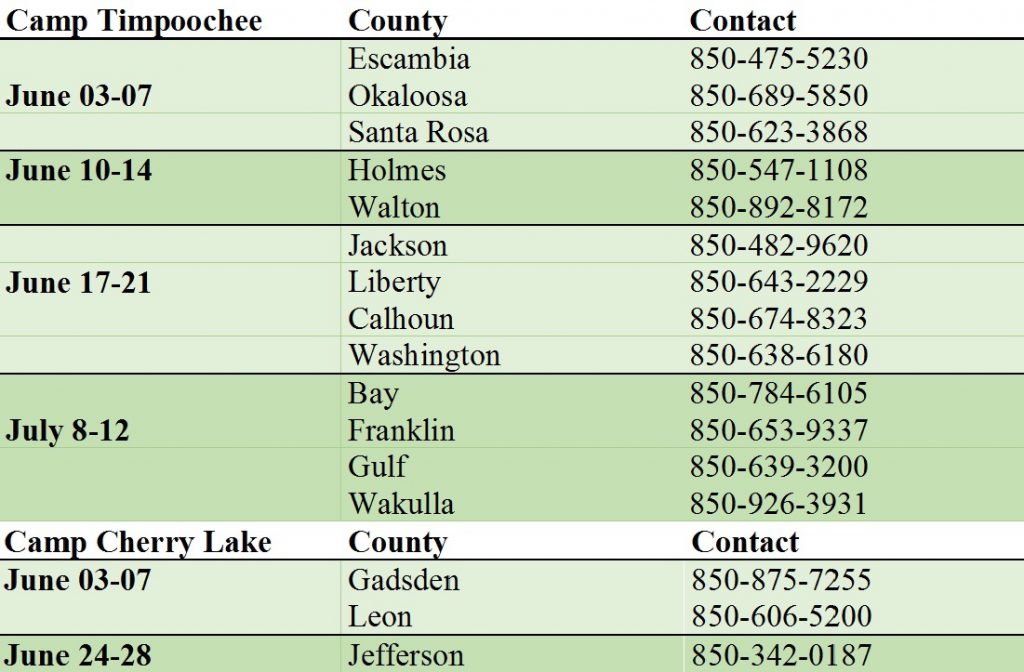
Who: Campers (8-13 years of age) & Counselors (14-18 years of age)
Where: Camp Timpoochee- 4750 Timpoochee Lane, Niceville, Florida 32578
Camp Cherry Lake- 3861 NE Cherry Lake Circle, Madison, Florida 32340
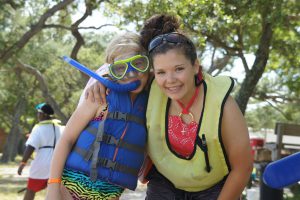
Youth volunteers, like our 4-H Camp counselors, are a great asset to the county 4-H program.
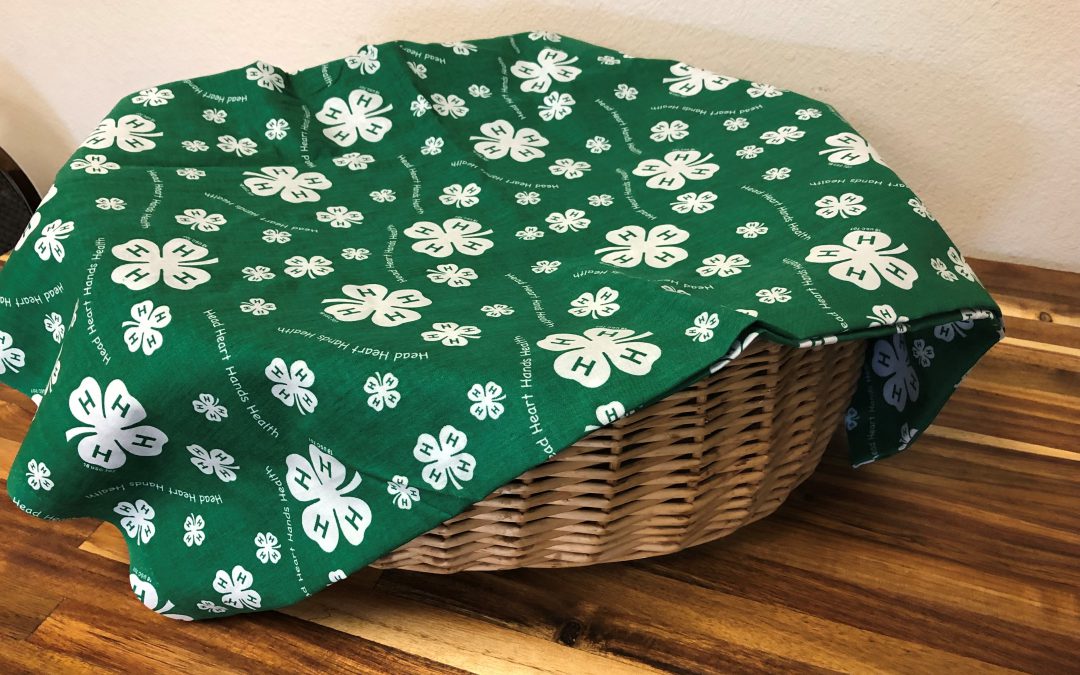
by Marie Arick | Mar 11, 2019
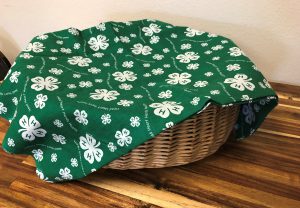
4-H Food Challenge Mystery Basket
Being creative in the kitchen…using a surprise set of ingredients…making a tasty dish…frequent watcher of The Food Network? Then the 4-H Food Challenge camp is the summer day camp for you!
Take a Sneak Peek
Here’s a sample list of possible ingredients in the Fruit & Vegetable category:
- 4 medium potatoes
- 1 cup carrots, sliced
- 1 cup of celery, sliced
- 1 ½ cups green bell pepper strips
- 1/3 cup onions, sliced
- 1 clove garlic, minced
- 1 tomato, cut into wedges
- 3 tablespoons of canola oil, divided
- ½ cup of water
- 2 tablespoons of low sodium soy sauce
- 1 ½ teaspoons of cornstarch
Any idea what you’d prepare? What would you name your dish?
Participants in the 4-H Food Challenge camp will work in teams with 3 to 4 members. Teams will be presented with:
- a food category
- a set of mystery ingredients
- 40 minutes to create a dish, prepare a presentation about their dish, and clean their work area
When time is up, teams will present their creation to a panel of judges describing their collaboration in creating the dish, food safety practices used by the team, how they worked together, and finally, a description of the dish including some nutrition information.
We all eat, so food safety and preparation are skills that we all need. 4-H Food Challenge campers will learn those skills along with nutrition knowledge, teamwork and presentation skills. Look for this day camp opportunity in your local UF/IFAS Extension 4-H program this summer, and join us in putting our skills to the test!
*The 4-H Food Challenge is loosely based on The Food Network show “Chopped” and adapted from the Texas 4-H Food Challenge Contest.
by Rachel Pienta | Feb 15, 2019
The 4-H Exchange Experience in the NW District

Sali and Gregor received a brief orientation to 4-H and life in the United States soon after their arrival.
Wakulla 4-H welcomed two international students via the Future Leaders Exchange Program at the beginning of September. The students, who are living with volunteer host families this school year, have become active 4-H members during their stay. Sali Polotov is from Tajikistan and is interested in studying geological science. Gregor Johanson is from Estonia and is interested in the performing arts. Both students attend 11th grade at Wakulla High School.
Eye Opening Experiences
Since their arrival, they have been part of the 4-H District III Council and attended Leadership Adventure Week where Gregor led a workshop on trust and communication.
During a recent interview with the 4-H Academic Year Program (AYP) FLEX students, Sali and Gregor reflected on their experiences at the midpoint of their year. Gregor shared it had always been a dream to study overseas. He saw an Instagram advertisement and decided to apply. He did not know about 4-H and learned about it after being accepted to the Academic Year Program. Since coming to the United States, he said has experienced some surprises. He was surprised by the American “addiction to fast and unhealthy food” and he has observed “that it seems to be more prevalent in rural areas.”
“There have been a lot of things that have surprised me, good things and bad things. Some of the good things include much friendlier and welcoming customer service, as well as a wider range of options for everything everywhere.”
– Gregor Johanson
Sali shared that he was motivated to come to the United States because he wanted to see the reality versus what was depicted in movies he had seen in Tajikistan. While Sali said that he knew nothing about 4-H before coming to Florida, he has enjoyed the opportunities to participate in 4-H clubs, special events and volunteer work.
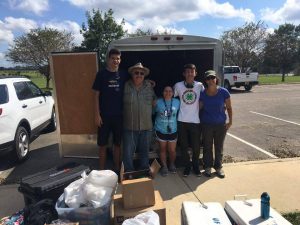
Sali Polotov joined other Wakulla 4-H members to deliver relief supplies to the NFREC office after Hurricane Michael.
One thing that surprised Sali about American life was how “American people love holidays. They do all of their best to spend an unforgettable moment.” Sali shared he has especially enjoyed his experiences volunteering in the aftermath of Hurricane Michael, snorkeling with manatees and celebrating Christmas with his host family.
Both young men are looking forward to an upcoming trip to Disney World and having more adventures with 4-H before their year in the United States concludes.
The Future Leaders Exchange Program (FLEX)
Since 1993, the FLEX Program has provided scholarships for high school students from Europe and Eurasia to spend an academic year in the United States while living with a family and attending an American high school. Florida 4-H partners with the FLEX program through the States’ 4-H International Exchange Programs. Students have opportunities to engage in both short-term summer programs and academic year exchange experiences. Nearly 60,000 youth and families have been positively impacted by international exchange through States’ 4-H programs since 1997.
The FLEX program is a competitive, merit-based scholarship program funded by the U.S. Department of State. Students gain leadership skills, learn about American society and values, and teach Americans about FLEX countries and cultures. The primary goal of the FLEX program is to improve mutual understanding and develop and strengthen long-term relationships between citizens of the United States and other peoples and countries. There are currently 17 countries that participate in the FLEX program: Armenia, Azerbaijan, Estonia, Georgia, Kazakhstan, Kyrgyzstan, Latvia, Lithuania, Moldova, Mongolia, Montenegro, Poland, Romania, Serbia, Tajikistan, Turkmenistan and Ukraine. Not all 4-H AYP students come to Florida through the FLEX program and students may come from other partner countries.
How to Get Involved with the 4-H AYP Program:
Families can become qualified to host an international student for the 10 month Academic Year Program by applying at https://states4hexchange.org. For more information, contact Georgene Bender, Florida 4-H AYP Coordinator, UF/IFAS Extension Faculty Emeritus – gmbender@ufl.edu.
For more information about this program or other 4-H programs in your county, contact your local UF/IFAS Extension Office.
Additional Resources:
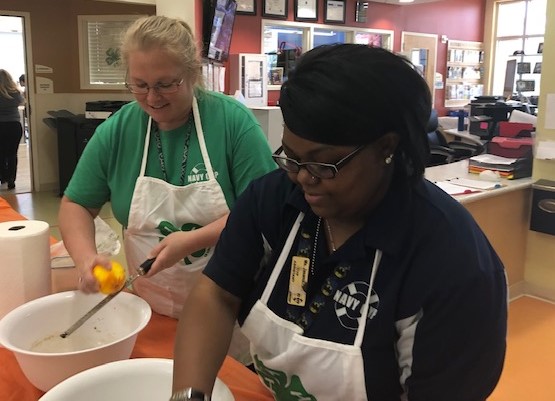
by pmdavis | Feb 14, 2019
Making lotions and bath scrubs, practicing relaxation and doing yoga…doesn’t this sound like a great 4-H club program? Discover 4-H Spa and Relaxation Clubs are a great way to learn about homemade body products while learning relaxation techniques. Youth create a day at the spa by making lotions, soaps, scrubs and lip balms while learning methods to relax like tennis ball massages, creating a happy list, doing yoga and creating a zen garden. An added bonus is homemade products are a fraction of the cost of purchasing and make great gifts for friends and family.
Make your own Luxurious Bath Salts
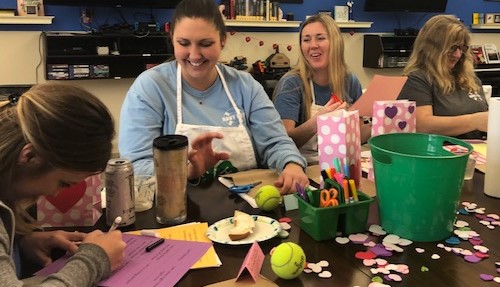
Naval Support Activity-Panama City staff learning how to making calm bags.
- ½ cup baking soda
- ½ cup powdered milk
- 1 cup sea salt
- 1 cup Epsom salt ( scented or plain)
- Use 3-5 drops fragrance oil designed for soaps or diluted essential oil for plain Epsom salt
- Mix ingredients
- Spoon the mixture into storage containers (wide mouth jars, bowls or zip style bags work well)
- Label your container with ingredients and direction for use – Pinterest has several cute label designs
Caution: Essential oils are very strong and can be a skin irritant if applied directly to your skin. National Association for Holistic Aromatherapy recommends diluting essential oils with a carrier oil: use 1 teaspoon of coconut, almond, olive, sunflower or jojoba oil with 2 – 12 drops of the desired essential oil. Then, mix 3-5 drops of the diluted oil to your bath salt mixture. Bath salts are generally safe for most when used properly, but you should talk to your doctor before using bath salts if you have medical conditions such as skin diseases, heart disease or diabetes.
How to Use Your Bath Salts: Fill your tub halfway with warm to hot water, and pour in about 1/2 cup (120 g) of bath salts. For a stronger concentration, you can always add more. If you prefer showers, take a handful and rub over desired area. Bath salts are great to exfoliate by removing dead skin cells leaving the skin smooth and fresh. Tired achy feet or hands? No problem! Add salts to warm water in a dishpan, and immerse your feet or hands and soak away the pain.

NSA-PC staff learning the 4-H Spa & Relaxation Curricula they will use in their 4-H programs.
For more information on 4-H and other programs like this, contact your local UF/IFAS County Extension Office, or visit Florida 4-H.
Are you an adult looking for ways to coach, teach and mentor youth? Contact the 4-H Agent in your county and enroll as a volunteer in 4-H Online. Volunteering not only strengthens the 4-H club, but also shows young people how to live with integrity, optimism, hope, determination, compassion, responsibility and resiliency – skills that will help them succeed in life.
Resource:
Discover 4-H Spa and Relaxation Clubs curriculum
by Julie Pigott Dillard | Feb 6, 2019
My very first Executive Board I was terrified! The thought of having to meet new people from across the state of Florida and having to plan an event made my stomach weak. Little did I know that my best friends would come from 4-H Executive Board weekends. I was able to make connections with people I never thought I would ever talk to, and I am so grateful that 4-H is the place where I am able to continue to make lifelong friendships. So don’t miss the chance of a lifetime.
What is the 4-H Executive Board?
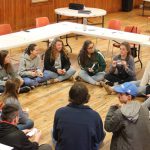
Learn more about 4-H state events at Third Exec.
The Florida 4-H State Executive Board consists of four delegates from each of the 13 4-H districts, up to 30 Executive Board Appointees, and the eight Florida 4-H State Officers. The members attend working committee meetings at Executive Board Weekends, where they offer input into our state events. Committee members also play a vital role in the implementation of those events. Other committees work on planning and implementing a state-wide community service project, fundraising, parliamentary procedure education, entertainment, and communication/marketing.

Work hard…play hard!
The Florida 4-H State Executive Board invites youth (4-H ages 13-18) to immerse themselves in the planning process behind state events including 4-H University, 4-H Legislature, 4-H Day at The Capital and Intermediate State. First and Second Executive Board sessions are reserved for those delegates appointees and state officers only, but any 4-H member can attend Third Executive Board.
Join us at Third Executive Board!
At Third Executive Board, you can expect to learn more about events you may not be familiar with. Throughout the weekend, you’ll also have to opportunity to participate in state-wide service projects, the Ways and Means fundraiser, Parliamentary Procedure contest, camp-wide games, dances, and more. The weekend of Third Executive Board is one like no other!
“Executive Board is the 4-H event that has something for everyone. It’s more than just ‘everybody is welcome.’ It’s that the event was made for them regardless of who they are or what background they come from.”
– Jared Heady – 4-H Executive Board Member, Walton County.

4-H friends are the best friends!
Third Executive Board will be held at 4-H Camp Cherry Lake in Madison, FL, on March 1-3, 2019. The cost for non-Executive Board Members is $120, and $110 for Executive Board Members. Registration for this event opens February 1, 2019 and closes February 22, 2019 in 4honline.
I hope to see you at Third Executive Board to make memories that will last a lifetime!

Kata Muellerleile, Florida 4-H State Council Reporter
Special thanks to Kata for being a guest writer this week!
For more information on 4-H in your county, contact your local UF/IFAS Extension office.
by Taylor Wilken | Feb 1, 2019
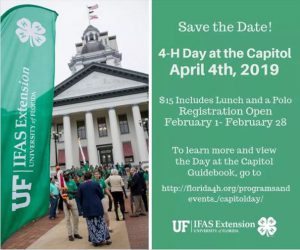 Last year, 520 youth and 170 adults from 34 Florida counties told the 4-H story filling the state capitol with 4-H advocates. Youth educated their representatives, senators, and legislative aides on how 4-H has made an impact in their lives while experiencing the political processes of state government.
Last year, 520 youth and 170 adults from 34 Florida counties told the 4-H story filling the state capitol with 4-H advocates. Youth educated their representatives, senators, and legislative aides on how 4-H has made an impact in their lives while experiencing the political processes of state government.
A sea of green will flood the Florida’s state capitol Thursday, April 4, 2019, as Florida 4-H members, faculty, volunteers, and families participate in the annual 4-H Day at the Capitol event.

2018 attendees on the steps of Florida’s historic capitol building.
4-H Day at the Capitol
- Who: All 4-H Members, Friends, Family and Alumni
- When: April 4, 2019
- Where: Tallahassee, FL
- Cost: $15 (includes lunch and a 4-H polo)
- Registration: February 1-28, 2019 in 4-H Online
Schedule
- 7:30-8:15am – Check-in
- 8:30am – Opening Assembly
- 9:00am – Group Photo
- 9:15am – Meetings with Representatives and Senators begins
- 12:00-1:00pm – Lunch Available for Pick-up (Chik-Fil-A)
- 1:00-1:30pm – Closing Assembly
Each county is encouraged to make appointments with senators and representatives and should schedule their day how it best suits the group. For detailed information on the schedule and to prepare for the event, be sure to read the The 4-H Day at the Capitol Guidebook.
Places to Visit/Things to do
Close to the Capitol, you’ll find several things to do to fill in the rest of your day.
- Governor’s Mansion
- Knott House
- Riley House and Museum
- 4-H Day at the Capitol Scavenger Hunt
- Florida Historic Capitol Museum
- Museum of Florida History
- Big Bend Farm
- For more information, check out Explore Tallahassee
Resources
For more information on 4-H Day at the Capitol or 4-H in your county, contact your local UF/IFAS County Extension Office.
 Summer camp…memories cherished and never forgotten. Camp fires, swimming, canoeing and kayaking, roughing it old-school in cabins and bunk beds, camp songs and skits around the fire, life-long memories and friendships…these are some of the experiences your child can have at 4-H Camp Timpoochee or 4-H Camp Cherry Lake this summer!
Summer camp…memories cherished and never forgotten. Camp fires, swimming, canoeing and kayaking, roughing it old-school in cabins and bunk beds, camp songs and skits around the fire, life-long memories and friendships…these are some of the experiences your child can have at 4-H Camp Timpoochee or 4-H Camp Cherry Lake this summer!













